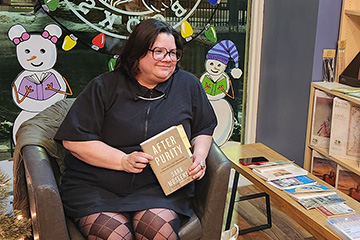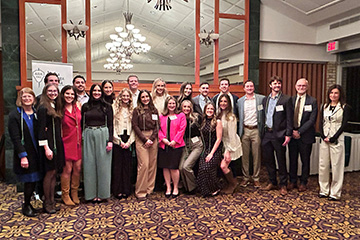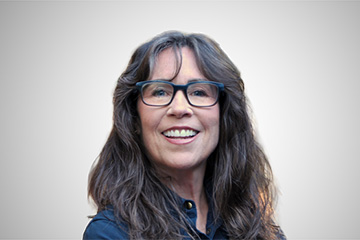Alumni gift-giving with purpose
Personal connections fuel support for students, programs
By Terri Finch Hamilton
From Centralight Winter 2020
Alumni don't usually give money just because they loved football games, the autumn colors at Warriner Hall or the tasty popcorn chicken bowls from Fresh Food Co.
The inspiration goes deeper.
Phil Allen discovered a grounding in philosophy that shaped his life's work — and his life.
Larry Burns and the children's foundation he leads see a CMU purpose that matches their own.
Deirdre Drake and Lester Booker Jr. rally for the inclusion that sometimes eluded them on campus.
This is personal.
'We need change agents on campus'
Young alum's scholarship fuels diversity and inclusion
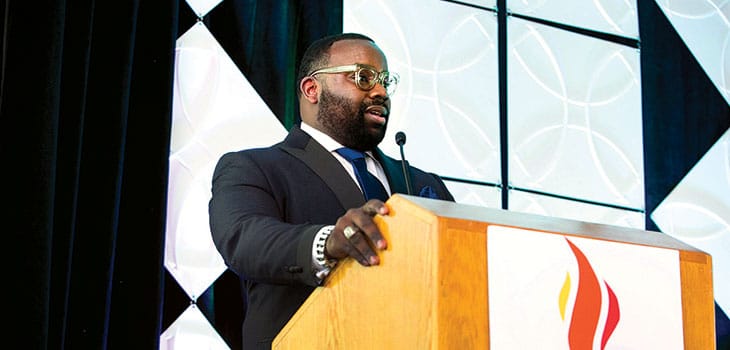
Lester Booker Jr. grew up on the east side of Detroit, but when he was 12 his family moved to a predominantly white community in Canton.
"It was a culture shock," he said. "I was one of just a few people who looked like me."
He played football and was on the Canton Township Youth Advisory Council.
"I got to know people as people," he said. "That broke down a lot of stereotypes."
Booker, '08, '10, continued that mission as a student at CMU, working in Multicultural Academic Student Services, planning events such as a Martin Luther King Jr. community peace brunch. He was a multicultural advisor in Thorpe Hall and was a resident assistant in Fabiano Hall.
Not long after graduation, Booker set a goal for himself: start a CMU scholarship by the time he turned 35.
Done.
Booker celebrated his 35th birthday in August with a fundraiser, asking friends and family to contribute to the Lester Booker Jr. Endowed Scholarship Fund for Diversity and Inclusion.
The $2,500 scholarship is awarded annually to a student passionate about the issues close to Booker's heart, preferably from Detroit.
Booker, who works in global communications at General Motors, has high hopes for the recipients.
"They'll be part of the culture of campus," he said. "They'll stand up for what's right. Maybe they're in a residence hall and they hear somebody say something they shouldn't. And they speak up. They challenge conversations. Maybe they become an RA on campus like I was and create programming for students and create an environment where everybody feels heard.
"That's the kind of leaders I hope these students are."
Meanwhile, they'll get a financial boost to finish college.
Booker calls this "a pivotal time" to encourage motivated students to attend CMU.
"We have racial tension across the country," he said. "We need change agents on campus. This is the time for people to come together and appreciate people for people."
He calls it "crucial for the success of CMU."
"I had an amazing experience at CMU," Booker said. "I want CMU to remain true to who it is. If I can help sow treasure and time into it, I will, so that same experience can be available to others — especially to people who look like me.
"In 10 years, I can't wait to hear about their achievements and journeys," he said. "That will be really gratifying."
Paying it forward by opening doors
Alum's 'full-circle story' provides students access and optimism
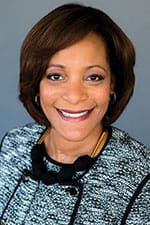
Deirdre Drake went to CMU with a scholarship designed to bring more people of color to campus.
She graduated without debt, thanks to donors who supported a young woman from Flint who had little means but great aspirations.
Now she's paying it forward, funding a scholarship administered by CMU's Office of Institutional Diversity.
"When I started thinking of ways to give back, it seemed natural to do it in a similar way," said Drake, '89, executive vice president and chief people officer for UScellular in Chicago. "My vision is it will go to kids who are a lot like me, in many respects. My parents didn't go to college and weren't sure if their kids would, either. I'd like to help a student who may not fully appreciate the doors that are opened by a post-high-school education."
Drake likes to talk about optimism and hope. When somebody who doesn't even know you believes enough in you to help fund your education, it inspires both.
Out of about 16,000 students at CMU in 1984, she said, she was one of just 300 African Americans.
Life on campus wasn't always easy. But she bonded with other students, made lifelong friends and flourished as a member of Alpha Kappa Alpha, a source of strength and support.
"For every moment of isolation, there was a moment of inclusion," she said.
Her successful 33-year career in human resources started in the CMU School of Business, "and I can't say enough about that foundation," Drake said. "It opened up a whole new world.
I learned how to rally people to collaborate and do good work in teams."
Drake rallied a sea of CMU graduates in December 2018 when she was commencement speaker, stressing the importance of adding character to the knowledge they gained at Central.
Be caring. Treat people with respect. Be fair. Give your time, talent and money.
She takes her own advice.
"I want to help CMU continue to thrive," Drake said. "Every penny counts.
"The older I get, the more aware I am of the importance of motivating other people," she said. "It's important, as we all think about our philanthropy, to carve some space for education."
She calls her CMU experience "a full-circle story."
"Who knew what worlds would get opened up to me when I ventured off that campus from the foundation that CMU provided for me?" she said.
Now, she looks forward to inspiring future students "to feel limitless opportunity by choosing CMU."
A thoughtful gift
$500K donation honors influential philosophy professor's work

When Phil Allen was a kindergarten teacher in Mount Pleasant, he wore holes in his jeans from scooting around the room on his knees. He wanted to be on his young students' level.
Since then, in a multifaceted career, he's been a leader in the Michigan Education Association, brokered business deals from Cuba to Kolkata, helped take Papa John's Pizza to Russia, masterminded telecom deals in China and bought a 150-acre organic hemp farm in Colorado.
When he decided to donate $500,000 to CMU, he gave it to the philosophy department.
What's the meaning of that?
It makes perfect sense to Allen, '74, '75, '80, who majored in philosophy and social science at CMU.
"Most of my successes and my ability to cope with the challenges of life are because of an understanding of the meaning of life — philosophy," he said. "Philosophy stretched my mind."
You expect philosophers to be deep and mysterious. Allen is matter of fact, dislikes small talk and did away with naps in his kindergarten class, sending all his young students home with their nap rugs.
"The nap was clearly meeting the teachers' needs, not the kids'," he noted.
Allen knows not everybody thinks philosophy is a smart career move.
"There isn't any direct application, except to teach it," Allen admitted. It doesn't give you the skill sets to a career, he said, but it teaches you how to think.
"It gives you the ability to analyze data, to make sound judgments and to evaluate other judgments that might not be sound.
"Philosophy won't make you a living," he said, "but it's a tool to live a better life."
Allen thinks everybody can benefit from philosophy. That's why he didn't designate his donation toward a scholarship, but to the philosophy department in general, for projects and programming.
Allen donated the money in honor of an influential philosophy professor, Dr. Nolan Kaiser, who lost his sight and his left hand at age 14 while replicating one of Thomas Edison's chemistry experiments too close to the gas stove. Kaiser went on to earn a doctorate in philosophy at the University of Michigan and taught at CMU for more than 40 years.
After Allen worked as Kaiser's teaching assistant, they became great friends. Now he hopes CMU's philosophy professors can inspire the next generation.
"Philosophy gave me the self-confidence and strength to be bold, daring and creative," Allen said. "I think everybody should take philosophy and be exposed to thoughts, experiences and ideas, just for personal growth."
An innovative partnership
'If you lead with integrity and transparency, money will follow'
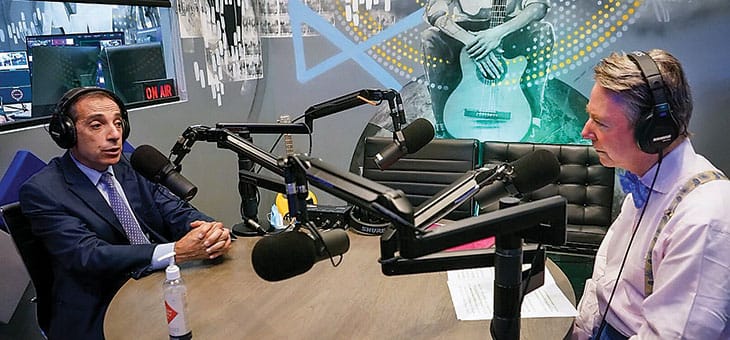
Larry Burns is a proud CMU graduate and says, "Fire Up!" as robustly as the next guy.
But that's not why the foundation he heads generously supports the CMU College of Medicine.
Burns, '78, looks at Central and sees potential to improve kids' health and their lives. It's the same mission he has as president and CEO of the Children's Foundation, a Detroit nonprofit dedicated to improving the health of Michigan children.
Now, with an innovative partnership that includes CMU's College of Medicine, The Children's Foundation, Children's Hospital of Michigan and University Pediatricians — a large group of pediatric specialists based at the children's hospital — the potential for improving the physical and mental health of young people is even bigger, Burns said.
And he believes it's potential worth supporting. The Children's Foundation has funded three endowed chairs that allow the hiring of expert professionals to lead clinical research to further the robust work to help kids thrive physically and emotionally.
The Children's Foundation also awarded a $50,000 grant to support a series of educational podcasts for health care providers, clinicians and educators about child development and health issues.
Burns loves that colleges all over the CMU campus collaborate to produce the podcasts, from arts and media to education and human services to health professions.
"A podcast can spread information not just far and wide, but quickly," Burns said.
The podcasts are just one example of how CMU's medical school is building an area of expertise around children's health and wellness, said Dr. George E. Kikano, dean of the CMU College of Medicine and CMU vice president for health affairs.
As CMU's College of Medicine expands its reach, its mission and its partnerships, funding like this comes at a perfect time, Kikano said.
"We couldn't do this without the Children's Foundation support," Kikano said.
Research is expensive, he said. So is hiring top-notch experts to head key areas of the medical school's infrastructure.
The money is crucial, Kikano said, but he loves that this partnership is about more than funding.
"There's alignment of mission, and open dialogue," Kikano said. "Money is a byproduct of that. If you lead with money, that's the wrong approach. If you lead with integrity and transparency, money will follow."
"The real power of this, the exciting potential, is these four entities working together," Burns said. "You don't often see that in health care. It can be very territorial. It strengthens the CMU brand.
"Some alumni said, 'Why do we need to start a medical school?' Stories like this exemplify why," Burns said. "CMU's medical school is different. Alumni need to know it's working."
